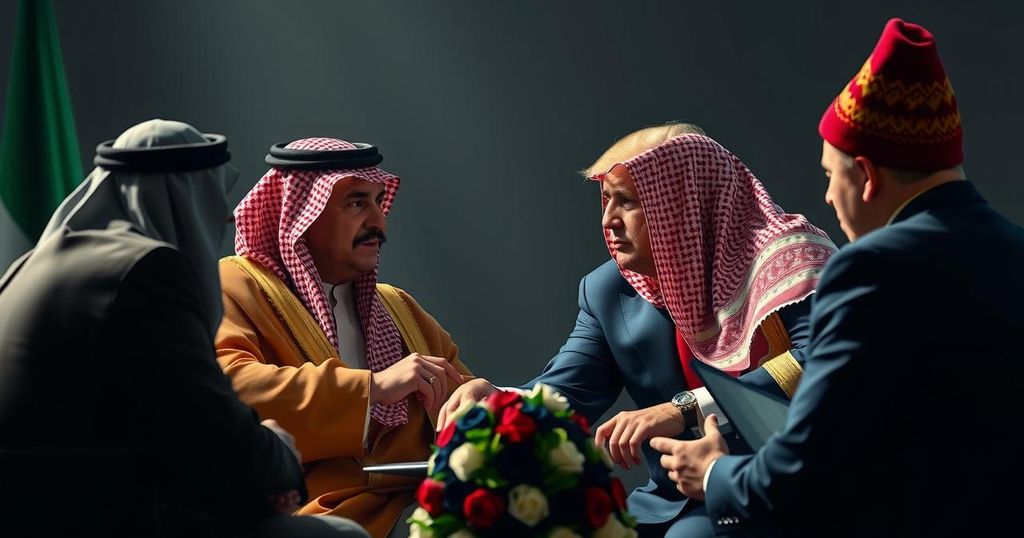Arab Leaders Optimistic Yet Cautious of Trump’s Middle East Strategy
Arab leaders congratulated Donald Trump on his election victory and expressed mixed feelings about his potential to end Middle East conflicts and address Iran’s influence. Analysts suggest Trump may pressure Israel to resolve conflicts, while concerns exist about possible recognition of Israel’s territorial claims and tougher sanctions on Iran.
Following the election results, Arab leaders extended their congratulations to Donald Trump on his victory as President of the United States. Among them were Saudi Arabia’s King Salman, Crown Prince Mohammed bin Salman, leaders from the United Arab Emirates, and Qatar’s Emir Sheikh Tamim bin Hamad, all expressing hope for strengthened partnerships. While some Arab leaders wish for Trump to fulfill his promises regarding the cessation of conflicts in the Middle East, others seek a firmer approach toward Iran. Dania Koleilat Khatib, president of a research center in Beirut, noted that during his campaign, Trump emphasized personal connections with Arab leaders, contrasting with what she perceives as Biden’s more transactional method. Arab leaders are particularly anxious for Trump to take decisive actions regarding the ongoing wars in Gaza and Lebanon. Khatib questioned how Trump intends to fulfill his promises regarding Gaza, expressing concern over the potential for Israeli aggression against Iran during his term. Crown Prince Mohammed bin Salman emphasized that Saudi Arabia would not improve its relations with Israel unless peace is established in Gaza and a Palestinian state is recognized. Wealthy Gulf nations have reassured Iran of their intentions not to permit Israeli operations from their airspace against Iran. In response to Trump’s election win, Iran portrayed its readiness for confrontation with Israel. Regional leaders, including Jordan’s King Abdullah, Egypt’s President Abdel Fattah al-Sisi, and Lebanon’s caretaker Prime Minister Najib Makati, also congratulated Trump while remaining engaged in peace negotiations. Analyst Osama Al Sharif speculated that Trump might exert pressure on Israeli Prime Minister Benjamin Netanyahu to conclude the conflicts before the upcoming presidential inauguration, indicating that the situations in Gaza have turned toxic. Al Sharif also highlighted that Trump’s approach toward Iran will be crucial, as he might resort to stricter sanctions. He pointed to the potential for Trump to communicate with Tehran through Russian President Vladimir Putin, a close ally of Iran. Nonetheless, Al Sharif expressed apprehension that Trump might endorse Israel’s annexation of significant portions of the West Bank, which would further complicate the situation for Palestinians and neighboring countries.
The article discusses the reactions of Arab leaders following Donald Trump’s electoral victory in the United States. It highlights their hopes for an end to ongoing conflicts in the Middle East and issues regarding Iran’s influence in the region. The article mentions key regional figures, their positions on Israel, and expectations concerning Trump’s foreign policy, particularly in relation to the Israeli-Palestinian conflict.
In summary, Arab leaders welcome Donald Trump’s election win with cautious optimism about the potential for his administration to resolve existing conflicts in the Middle East. While there is hope for ending warfare in Gaza and establishing a Palestinian state, apprehensions remain regarding Trump’s policy toward Iran and the implications of potential recognition of Israeli territorial claims. Overall, the leaders seem united in their desire for stability but divided on the means to achieve it.
Original Source: www.voanews.com




Post Comment